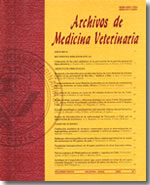Brucella abortus: immunity, vaccines and prevention strategies based on nucleic acids
Main Article Content
Abstract
Brucellosis, a disease caused by the intracellular facultative bacteria Brucella abortus, is a widely distributed zoonosis throughout the world, affecting mainly cattle and causing sterility in males and abortion in pregnant females. Protection against B. abortus relies on the activation of cellular immunity involving lymphocytes T CD4+, subset Th1, secreting gamma-interferon (γ-INF), a cytokine stimulatings macrophage bactericidal activity and cytotoxic activity of lymphocytes TCD8+, which are able to lyse Brucella infected cells. The main antigenic components of Brucella are lipopolysaccharide (LPS) and proteins, especially superoxide dismutase (SOD) with demonstrated immune potential. Brucellosis spreading is prevented with vaccines using attenuated or inactivated strains of B. abortus, such as strains 19, 45/20 and RB51. On the other hand, several investigators are making efforts to obtain immunity using antigenic structures of Brucella as subcellular vaccines and recently, genetic vaccines based on DNA and RNA molecules. The aim of this review is to give a current overview about brucellosis, its pathogenicity and the clinical syndrome. Firstly, an analysis of the genetic, antigenic and immune characteristics of Brucella is presented. Secondly, the vaccines presently used for prevention and the research on subcellular vaccines are discussed. Finally, the new approach in the vaccine investigation, genetic DNA and RNA vaccines, for Brucella is presented.

